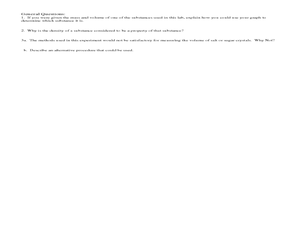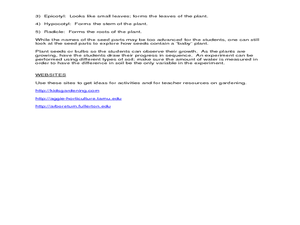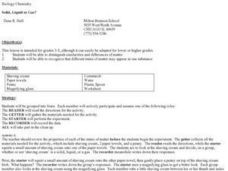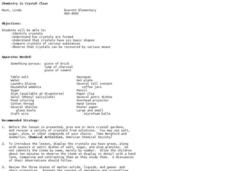Curated OER
I've Seen That Shape Before
Students identify geometric solids. In this shape lesson, students explore the characteristics of geometric solids. They locate pictures of shapes on the internet, and identify the shapes. Students draw pictures of shapes, take...
Curated OER
Geometry and Shapes
Fourth graders are asked to name different shapes.Four to five students to share their answers with the class. The teacher leads the discussion in geometry about the properties associated with shapes.
Curated OER
Living in a Geometrical World
Students participate in a series of hand-on, online, and multimedia activities to examine 2 dimensional and 3 dimensional shapes. They describe common geometric solids. They construct rectangular prisms using straws and ribbon.
Center for Learning in Action
Density
Explore the concept of density within states of matter—gases, liquids, and solids—through a group experiment in which young scientists test objects' texture, color, weight, size, and ability to sink or float.
Curated OER
Plane Shapes and Solid Figures
In this math worksheet, students study the properties of plane shapes and solid figures. Students fill out a chart after they have calculated the number of flat surfaces, edges and vertices.
Curated OER
Finding Volume
Sixth graders develop a rule for finding the volume of rectangular solids using colored cubes. They investigate the properties of solid figures and find the volume of an object by counting units. Students fill spaces with standard-sized...
Curated OER
Geometric Solids
Fourth graders examine the properties of geometric solids. Given geometric figures, they brainstorm observations. In groups, 4th graders identify solids and discuss the physical properties. Each student creates a Venn diagram and...
Curated OER
Solid Water
Students turn solid water (ice) into liquid water. In this solid and liquid water lesson plan, students use water, ice, cups, and heat in order to change water from one state to another. They draw their findings as well.
Curated OER
Mass and Density of an Irregular Solid
In this physics worksheet, students determine the density of irregular solids using water displacement method to complete 7 problems and short answer questions.
Curated OER
The Three States of Matter
Students explore the three states of matter. In this physics lesson, students are shown examples of solids, liquids, and gases. Students make cookies and identify the three states of matter during the baking process.
Curated OER
Solids, Liquids and Gases - Part 2
Young scholars experiment with balloons, soda water and raisins to find out about the states of matter. In this solids, liquids and gases instructional activity, students complete a group activity with balloons to recognize the state of...
Curated OER
What is Matter?
Students investigate what matter is and how it changes states. In this physical properties lesson, students examine the vocabulary database and identify the characteristics of the three phases of matter. Students perform a liquid vs....
Pennsylvania Department of Education
A Geometric Scavenger Hunt
Fifth graders connect their knowledge of polygons and polyhedrons. For this geometric shapes lesson, 5th graders identify and classify two- and three-dimensional objects. Students construct a polyhedron out of polygons and describe their...
Curated OER
Three States of Matter
Third graders investigate the three states of matter and the properties of materials as they undergo physical changes. They identify examples of each type of matter, role-play atoms in solids, liquids, and gases, and conduct an...
Discovery Science Center
Kindergarten Observing, Comparing and Contrasting
Although this is a science lesson, it can be adapted to help meet Common Core standards in math as well. Starting scientists describe physical properties of objects and explore three forms of water. To address the Common Core, they can...
Curated OER
States of Matter Summary
In this states of matter worksheet, students are given a summary of the particle arrangement, the motion of particles, the properties of particles and models of particles in solids, liquids, and gases. Melting, evaporating and boiling,...
Curated OER
Solid, Liquid, Or Gas?
Students identify physical characteristics and group objects for a picnic using the states of matter for each object and using literature to introduce the states of matter.
Curated OER
It Matters
Students use descriptive vocabulary to discuss the attributes of matter. Then, they sort objects or pictures by the type of matter they are comprised of. Finally, students match objects of matter with similar attributes and create a...
Curated OER
Chemistry is Crystal Clear
Students observe crystals and their shapes and formation. In this crystal formation lesson, the teacher prepares crystal gardens for the students to observe, then the class finds examples of crystals in nature and observe a teacher...
Curated OER
Introducing Powers and Models
Students construct two dimensional models to illustrate squared numbers. For this geometry lesson, students use graph paper and an x/y axis to build squares exponentially. Students identify powers and relationships between various...
Curated OER
Evidence of Chemical Change
In this chemical change worksheet, students conduct 4 experiments set up around the room. They follow the instructions at each station for each experiment and list the physical properties and observe any changes at each station. Students...
Center for Learning in Action
Introduction to the States of Matter
Liquids, gases, and solids are the states of matter in which scholars investigate in a lesson plan that offers in-depth information and engaging activities that look into the three states and the changes their properties make when mixed...
Center for Learning in Action
Introduction to Matter
Begin your states of matter lessons with a demonstration designed to introduce the concept that all matter has properties. Reinforce this concept through vocabulary exploration, and the creation of atom models; salt, water, and carbon...
Texas Education Agency (TEA)
Geometry in Architecture #1
Discover how to analyze architecture from a geometric standpoint. The fourth installment of an 11-part unit on architecture first provides a presentation on axis, balance, basic form, formal, pattern, proportion, symmetry, and tripartite...

























